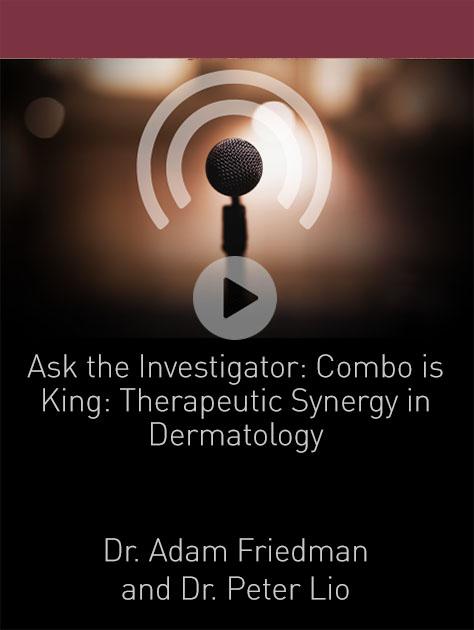Peter A. Lio, MD of Medical Dermatology Associates of Chicago shares his thoughts with us on his recent JDD podcast. Read below, then listen to Combo is King: Therapeutic Synergy in Dermatology (scroll to the second row of recordings).
If I am a resident, why should I listen to this podcast?
As a resident, one quickly gets used to a steep learning curve, but it turns out that residency is only the beginning! Once the basics are mastered, there is an exciting universe of possibilities in the undiscovered frontiers of clinical practice. This podcast takes a peek into those frontiers and looks at what might be happening when products are used in concert in the real world, outside of clinical trials.
As a young dermatologist, why should I listen to this podcast?
The difference between “I’m really not much better” and “I’m doing better!” can be pretty small sometimes… as we refine our clinical skills and thinking, it becomes clear that leveraging all of the little things helps stack the deck in favor of the latter. Herein we explore some clinical synergies that may be helpful in maximizing existing therapies. While we await new ones to be developed.
What drew you to this focus on therapeutic synergy?
It has always been striking to me that when we study medications they are almost always in isolation, but in practice we practically never use monotherapy. This dichotomy got me thinking: what combinations may be synergistic? Could some actually be antagonistic, cancelling out some of the benefits? This paper is the start of asking those questions… a lot more needs to be done to get better answers, for sure.
You mention holistic factors like diet, for example, affecting rosacea. Do you think this factor is often overlooked in other ailments of the skin?
As someone who is interested in alternative and integrative medicine, I do think about things like this all the time. Many of my patients focus on these areas as well. So even if I wasn’t interested, I’d have to have some thoughts here. My overall sense is that diseases–like people–are probably more complex than we give them credit for being. Many factors such as diet, stress, quality of sleep, and other aspects of the environment likely have at least some measurable effect on many of the diseases we treat in dermatology, to varying degrees. Some diseases like allergic contact dermatitis or dermatitis herpetiformis can be completely “cured” by avoiding the driving agent. Others, like acne or atopic dermatitis, may have external factors that can exacerbate disease, and others that may foster healing. These are hard to study, but may be worth some exploration, especially for certain patients.
Do you think using crowdfunding websites to fund clinical studies might be a wave of the future?
Yes, I do. Part of the problem with studying things like synergy or holistic and alternative treatments is that generally these are not funded by drug companies or the government. This is part of the reason why there is such limited data in these areas. However, drug companies and the government have interests that may not align with many sufferers of a disease. And in these cases populist movements could drive funding via the web–it would be pretty incredible to see this happen!
What is one thing you would like people to know on this topic that you did not get to mention in the podcast?
I think it is so important that we as dermatologists and health care practitioners continue to innovate and improvise. And try new things to help our patients. Looking for synergies is just one of the ways we can do this without a lab or massive federal grant funding.
Click to listen to Combo is King: Therapeutic Synergy in Dermatology (scroll to the second row of recordings).

